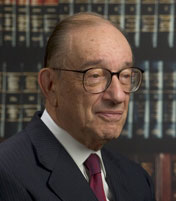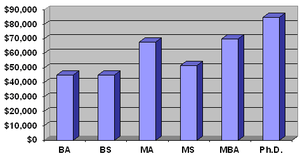Economist

An economist is an individual who studies, develops, and applies theories and concepts from economics, and who writes about economic policy. Within this field of study there are many sub-fields, ranging from the broad philosophical theories to the focused study of minutiae within specific markets, macroeconomics analysis, microeconomics analysis or financial analysis, involving analytical methods and tools such as econometrics, statistics, economics computational models, financial economics, financial mathematics and mathematical economics. Adam Smith is perhaps the most famous economist, as the founder of modern economics.
In academia
Most major universities have an economics faculty, school or department, where academic degrees are awarded in support of potential professional economists. However, many prominent economists come from a background in mathematics, engineering, business, law, sociology, or history.

The Bank of Sweden Prize in Economic Sciences in Memory of Alfred Nobel is a prize awarded to economists each year for outstanding intellectual contributions in the field of economics. The Prize Winners are announced in October every year. They receive their awards (a prize amount, a gold medal and a diploma) on December 10, the anniversary of Alfred Nobel's death. [1]
Professions
Economists work in academia, in government and in the private sector, where they “...study data and statistics in order to spot trends in economic activity, economic confidence levels, and consumer attitudes. They assess this information using advanced methods in statistical analysis, mathematics, computer programming...and “... they make recommendations about ways to improve the efficiency of a system or take advantage of trends”. as they begin. [1]. It is more difficult to define the professional category of "economists," though, than to define regulated professions such as law or engineering.
While a lawyer or engineer can only be a person with a law or engineering degree, respectively, who has been licenced by state or national licencing bodies, there is not a legally-required educational requirement or licence for economists. In some job settings, the possession of a Bachelor's or Master's degree in economics is considered the minimum credential for being an economist. However, in some parts of the US government, a person can be considered an economist as long as they have four or more university courses in economics. As well, a person can gain the skills required to become a professional economist in other related disciplines, such as statistics or some types of applied mathematics, such as mathematical finance or game theory.
A professional working inside of one of many fields of economics or having an academic degree in this subject is widely considered to be an economist, and any person within any of these fields can claim to be one. Economists are also employed in banking, finance, accountancy, commerce, marketing, and business administration.
Politicians often consult economists before enacting policy, and many statesmen have academic degrees in economics. However, politics and economics have not always meshed well. Peter G. Klein wrote:
- Economists are not traditionally popular as policy advisors. Economics teaches that resources are limited, that choices made imply opportunities forgone, that our actions can have unintended consequences. This is typically not what government officials want to hear. When they propose an import tariff to help domestic manufacturers, we economists explain that this protection will come only at the expense of domestic consumers. When they suggest a minimum-wage law to raise the incomes of low-wage workers, we show that such a law hurts the very people it purports to help by forcing them out of work. On and on it goes. As each new generation of utopian reformers promises to create a better society, through government intervention, the economist stands athwart history, yelling "Remember the opportunity cost!" [2]
United States

According to the United States Department of Labor there were 13,000 economists in the US with a median salary of roughly $72,780 with the top ten percent earning more than US$ 129,170 annually.[3] About 400 colleges and universities grant about 900 new Ph.D.s in economics each year. The type of academic degree, Bachelors, Masters or Doctorate degree had significant influence on an individuals job outlook and salary. While the overall expected job growth for economists remains below nation average, the demand for those with a Doctorate, especially those employed in the corporate sector, is expected to increase at a considerably faster pace.[4] Incomes were highest for those in the private sector, followed by the federal government with academia and high schools paying the lowest incomes. Median salaries ranged from $45,000 for those with a Bachelor to $85,000 for those with a Ph.D. in economics. A recent and continuous study by PayScale.com showed Economic consultants with a Ph.D. had the overall highest median income for any group making $116,250, the median salaries for an assistant professor was $63,500, for an associate professor it lay at $67,000 and $85,000 for a full professor. The overall median income for doctorates in academia was $75,000 compared to $125,000 in consulting and $87,000 in banking.[2]
United Kingdom
The largest single professional grouping of economists in the UK are the more than 1000 members of the Government Economic Service, who work in 30 government departments and agencies.
Famous economists
Founders of fields
According to some scholars, "the pioneer economist of the world" was Chanakya (c. 350-283 BC) an adviser and prime minister to the first Maurya Emperor Chandragupta from 340-293 BC.[5] In the 1700s, one of the first economic writers was Richard Cantillon (1680-1734), who wrote the treatise Essai Sur la Nature du Commerce en Général. Early founders of economic concepts included the Scottish philosopher, economist, and historian. David Hume 1711-1776) and the so-called "classical economists": English demographer and political economist Thomas Malthus (1766-1834), political economist David Ricardo (1772–1823), and the Scottish moral philosopher and political economist Adam Smith (1723-1790).
Other early developers of economic concepts include the British philosopher, political economist John Stuart Mill (1806–1873); French economist and free trade advocate Jean-Baptiste Say (1767–1832); Prussian philosopher, political economist, and revolutionary Karl Marx (1818–1883); French classical liberal theorist and political economist, Frédéric Bastiat (1801–1850); and English economist and logician William Stanley Jevons (1835-1882).
Founders of important economic concepts who were alive during the 20th century include the Austrian economist Eugen von Böhm-Bawerk (1851–1914); the founder of the Austrian School of economics, Carl Menger(1840–1921); British economist, developer of Keynesian economics, and influential founders of modern theoretical macroeconomics John Maynard Keynes(1883–1946); American economist, health campaigner, and eugenicist Irving Fisher (1867-1947); Austrian-British economist and political philosopher, and one of the most influential members of the Austrian School of economics Friedrich Hayek (1899-1992); American economist, public intellectual, and laissez-faire capitalism advocate Milton Friedman (1912–2006).
References
- Robert Sobel The Worldly Economists (1980).
- ^ http://www.princetonreview.com/cte/profiles/dayInLife.asp?careerID=56
- ^ a b "Pay Scale, US income of Economists". Retrieved 2006-12-22.
- ^ US Bureau of Labor, Occupational Outlook Handbook
- ^ "The Market for new PhD Economists 2002" (PDF). Retrieved 2006-09-11.
- ^ L. K. Jha, K. N. Jha (1998). "Chanakya: the pioneer economist of the world", International Journal of Social Economics 25 (2-4), p. 267-282.
Mwai Kibaki
